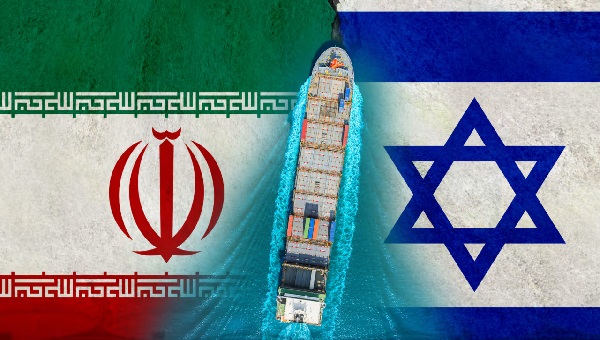*US under lens for arming Israel
*World condemns Netanyahu’s assault against Gaza residents
-: R Muthu Kumar :-
Air raid sirens and explosions are being heard in cities across Israel, including Tel Aviv and Jerusalem, as Israeli, US, UK and Jordanian forces shoot down missiles and drones launched from Iran.
Tehran says it carried out the attack in response to an Israeli raid on the Iranian consulate in Syria and says the matter can now “be deemed concluded”.
US forces helped intercept dozens of Iranian drones and missiles launched against Israel from Iran, Iraq, Syria and Yemen.
The Arab American Anti-Discrimination Committee (ADC) has said that Biden’s unconditional backing of Israel is weakening the US on the global stage and making it “ineffective” in advocating global norms.
“The Biden administration’s unwillingness to end Israel’s six month long genocide in Gaza, and the complete disregard for United States and international law, is a major reason for the dangerous escalation in the region this evening,” the group said in a statement.
“Longstanding US policy of impunity and unconditional support for Israel is what has brought us to the brink of a much larger, and very deadly regional war. Enabling Israel’s genocide and regional hubris beyond Gaza is walking the region into total devastation.”
President Biden’s ‘ironclad’ backing of Israel is coming into conflict with the US’s stated goal of averting regional war Anti-Israeli sentiments have always been strong in Iran, particularly among the influential Muslim clergy who are close to Khamenei. However, Israel had not previously openly attacked Iranian diplomatic institutions, meaning the confrontation has reached a new level.
This begs the question: does Iran indeed want war, and is it ready for a conflict?
The Middle East has been in turmoil for decades and it’s about to get even worse.
The escalating tensions have put further strain on Washington’s foreign policy. Already, the US is caught between two seemingly conflicting priorities: offering unconditional support for Israel and preventing the conflict in Gaza from expanding.
In the midst of the violent Israeli assault on Gaza and the possible offensive into the southern Gaza city of Rafah, President Biden must make a momentous decision that will define his presidency.
Should he continue to support our long-time ally in the Middle East and turn a blind eye to the slaughter of thousands of innocent Palestinian men, women and children? Or should the U.S. look to its better angels and end shipments of weapons of mass destruction to the rogue government of Israeli Prime Minister Benjamin Netanyahu?
The carnage will only get worse if the prime minster delivers on his promise to widen the trail of death and destruction and attacks Rafah.
Amidst these gruesome happenings, tension between Washington and Tehran has been a growing undercurrent of the war in Gaza. The evolving flashpoints in the world’s most volatile region as well as the challenges for U.S. diplomacy, the new triggers for a wider regional conflagration and the historical backdrop.
In addition to the conflict dynamics between Israel and Lebanon, the Red Sea, Iraq and Syria have all become arenas of spillover confrontation from Gaza. A violent spike in any of these hot spots could quickly escalate to a wider confrontation.
The Biden administration is using every diplomatic and military tool in the hope that U.S. pressure can keep the conflict from escalating into a region wide catastrophe, so says editorial in Washington Post.
The fury of the attacks by Israel this April, evokes the dynamics of summer 1914, when a war that every power sought to avoid suddenly appeared inevitable, with consequences that no one could predict.
President Biden said on Friday that he expects that Iran will strike Israel “sooner [rather] than later” in retaliation for an April 1 attack that killed seven Quds Force operatives in Damascus, Syria.
The wider war that the White House has sought to avoid since Hamas’s Oct. 7 terrorist attack and Israel’s devastating response seemed possible within hours.
Earlier this week Biden threatened to shift U.S. policy on Israel if Prime Minister Benjamin Netanyahu did not do more to support a cease-fire that included the release of hostages by Hamas and more humanitarian aid to the Palestinians.However, he also vowed that Israel could count on American support for any threat from Iran.
The U.S. has limited diplomatic options in dealing with the Islamic republic, with most of Iran’s allied militias already on the U.S. terrorism list. Washington has had no formal relations with Tehran since April 1980, after the then new revolutionary government refused to free dozens of American envoys seized in the U.S. Embassy takeover.
U.S. diplomacy in the Middle East was stuck on multiple fronts during the first six months of the Gaza war. The dangers of a wider war were reflected in the increasingly inflammatory language as the Gaza war hit the six-month mark. Iran vowed revenge for the Israeli attack on its generals in Syria.
Between 1982 and 2024, Iran built the most powerful and well-armed alliance in the Middle East — with branches from the Mediterranean across the Red Sea to the shores of the Persian Gulf — dubbed the Axis of Resistance. It also developed an independent arms industry. By 2024, the largest share of the world’s drones in use were manufactured in Iran according to reports.
The tremors of war has been felt in India too! During initial days of the war saw slight price hike on Indian imports, the costs fell sharply after some weeks. However, the Indian oil supply would be in jeopardy if Iran attacks Israel, which would mean a dramatic escalation of the conflict, as more bottlenecks are expected, and the financial markets globally experienced turbulence due to an escalation in geopolitical tensions.
For President Biden who is running for reelection, there’s nothing worse than looking weak. He has spoken with fury to Israel leaders to stop attacks on innocent people in Gaza. His criticism of the prime minster Netanyahu is well deserved, but the failure to act on those complaints makes the president look impotent.
So what next? it the question uppermost in the minds of war experts watching the current scenario.








